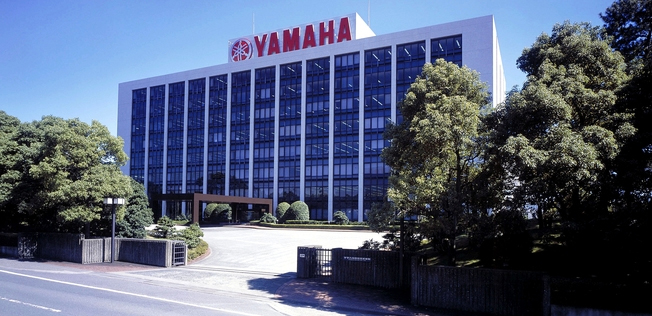Yamaha Motor reveals record-breaking 2021 business results
Yamaha Motor Co., Ltd. has announced its consolidated business results for the full 2021 fiscal year.
Net sales were 1,812.5 billion yen (an increase of 341.2 billion yen or 23.2% compared with the previous fiscal year) and operating income was 182.3 billion yen (an increase of 100.7 billion yen or 123.3%).
Ordinary income was 189.4 billion yen (an increase of 101.7 billion yen or 116.0%) and net income attributable to owners of parent was 155.6 billion yen (an increase of 102.5 billion yen or 193.1%). These represent the company’s highest figures ever for net sales and income. For the fiscal year, the U.S. dollar traded at 110 yen (a depreciation of 3 yen from the previous fiscal year) and the euro at 130 yen (a depreciation of 8 yen).
Thanks to higher unit sales as well as the increase in unit purchase prices, net sales increased despite the impacts of lower production, labor shortages, and more brought on by the supply shortage of semiconductors and other parts.
Operating income rose significantly in part due to the increase in sales but also due to the curbing of fixed costs through the implementation of remote work and other digital methods, foreign exchange impacts, and other factors working to absorb the effects of soaring logistics costs and raw material prices.
Forecast of Consolidated Business Results for the Fiscal Year Ending December 31, 2022
| Net Sales | 2,000 billion yen (an increase of 187.5 billion yen or 10.3% from FY2021) |
| Operating Income | 190.0 billion yen (an increase of 7.7 billion yen or 4.2% from FY2021) |
| Ordinary Income | 190.0 billion yen (an increase of 0.6 billion yen or 0.3% from FY2021) |
| Net Income Attributable to Owners of Parent | 130.0 billion yen (a decrease of 25.6 billion yen or down 16.4% compared with FY2021) |
Results by Business Segment
Land Mobility Business
Net sales were 1,179.7 billion yen (an increase of 233.3 billion yen or 24.6% compared with the previous fiscal year) and operating income was 68.7 billion yen (an increase of 50.3 billion yen or 272.4%).
For motorcycles in developed markets, the current boom in outdoor and family recreation led to correspondingly higher unit sales than last year in all regions, which drove up both net sales and profits. On the other hand, the market inventory shortage remains ongoing due to an insufficient supply of semiconductors and other components as well as logistics delays caused by a lack of shipping containers. Although profitability remained out of reach, the deficit gap was significantly reduced.
With motorcycles in emerging markets, demand rose year on year in the Philippines, Indonesia, Thailand, and other countries as governments shifted strategies to balance implementing COVID-19 countermeasures with allowing economic activity. For the Company, further waves of COVID-19 cases led to a decrease in factory and dealership utilization rates, but higher sales of premium segment models led to an improved model mix, resulting in higher sales and profits.
With recreational vehicles (all-terrain vehicles, ROVs, and snowmobiles), the strong demand for outdoor recreation continued undeterred by the resurgence of COVID-19 cases. Despite the impact of production delays brought on by the parts supply shortage and other factors, the solid sales performance of the Wolverine RMAX series led to higher unit sales overall, bringing the business higher net sales and profits that landed it successfully in the black for the year.
For electrically power-assisted bicycles, the current reevaluation of the advantages bicycles have for getting to and from nurseries, schools, and offices helped keep sales of complete Yamaha-brand bicycles in Japan and e-Kits for Europe strong, resulting in increased sales and profits for the business overall.
Marine Products Business
Net sales were 391.1 billion yen (an increase of 62.8 billion yen or 19.1% compared with the previous fiscal year) and operating income was 76.8 billion yen (an increase of 26.2 billion yen or 51.7%).
Demand for large outboard motors remained firm in developed markets while outboard demand recovered in emerging markets. The global shipping container shortage is still causing delays in loading ships with product, but boosting our production numbers has improved our product supply and this increased unit sales. Also, boat and personal watercraft unit sales increased due to progress with measures to counter part procurement delays. As a result, sales and profits increased for the Marine Products business as a whole.
Robotics Business
Net sales were 120.3 billion yen (an increase of 37.3 billion yen or 44.9% compared with the previous fiscal year) and operating income was 17.6 billion yen (compared to an operating income of 3.3 billion yen the previous fiscal year).
In the first half of fiscal 2021, the effects of COVID-19 settled down particularly in Asian countries (including China, Taiwan, and South Korea) and capital investment gained steam. From the second half of the fiscal year, sales grew stronger in Japan, Europe, and North America, and unit sales of both surface mounters and industrial robots increased. Further, continued strong sales by Yamaha Robotics Holdings Co., Ltd. and the effects of structural reforms led to it successfully achieving profitability. As a result, sales and profits for the business both increased overall.
Financial Services Business
Net sales were 48.6 billion yen (an increase of 2.6 billion yen or 5.6% compared with the previous fiscal year) and operating income was 19.1 billion yen (an increase of 11.6 billion yen or 153.1%).
The significant decrease in market inventories led to a decrease in wholesale receivables, but an increase in retail financing and a decrease in the allowance for doubtful accounts as a one-time factor brought in higher sales and profits.
Other Products
Net sales were 72.7 billion yen (an increase of 5.3 billion yen or 7.8% compared with the previous fiscal year) and operating income was less than 1 billion yen (a decrease of 1.7 billion yen or 97.6%).
Sales rose due to an increase in golf car and multipurpose engine unit sales, but operating income declined year on year due to one-time costs incurred by other product categories in the business.




